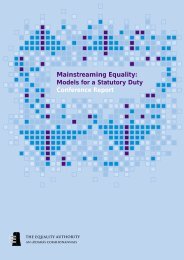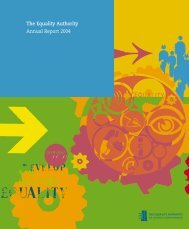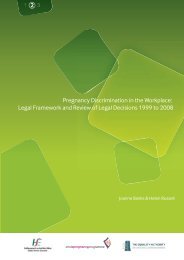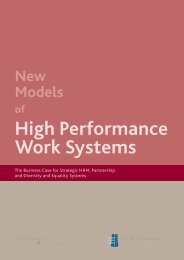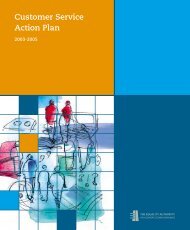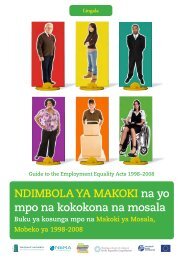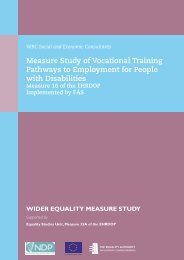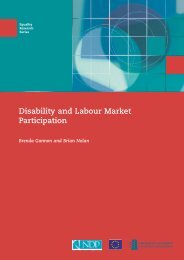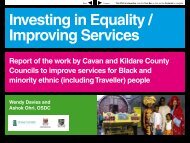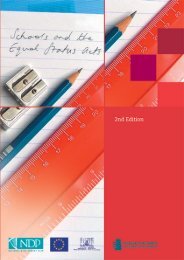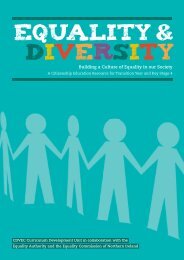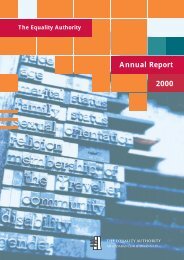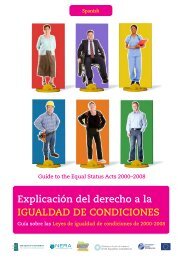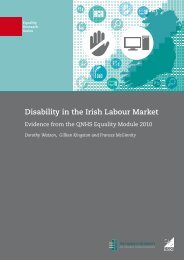Pregnancy and Employment: A Literature Review - Crisis Pregnancy ...
Pregnancy and Employment: A Literature Review - Crisis Pregnancy ...
Pregnancy and Employment: A Literature Review - Crisis Pregnancy ...
Create successful ePaper yourself
Turn your PDF publications into a flip-book with our unique Google optimized e-Paper software.
<strong>Pregnancy</strong> <strong>and</strong> <strong>Employment</strong>: A <strong>Literature</strong> <strong>Review</strong><br />
work <strong>and</strong> prolonged st<strong>and</strong>ing was significantly associated with hypertension or pre-eclampsia (see Chapter 2). In<br />
addition to the immediate effects of discrimination, women who experience poor treatment during pregnancy<br />
are less likely to return to employment following childbirth, which has further long-term consequences for their<br />
economic position.<br />
Workplace experiences may also be particularly important for women experiencing crisis pregnancy. A supportive<br />
environment <strong>and</strong> flexible working arrangements are crucial for those who are parenting alone <strong>and</strong> those who<br />
may have additional dem<strong>and</strong>s which arise for personal, family or health reasons. The work environment may also<br />
influence whether or not a pregnancy is perceived as a crisis. Discrimination against women during pregnancy –<br />
<strong>and</strong> particularly pregnancy-related job loss – can precipitate a crisis for the woman involved. In contrast, where<br />
organisational culture <strong>and</strong> practices are family-friendly, women may be less likely to view pregnancy as a crisis that<br />
affects their job or career plans.<br />
The way in which women are reintegrated into employment following any interruption for childcare is important<br />
for gender equality in the labour market <strong>and</strong> for equality on the grounds of family status. The duration of time<br />
spent out of the labour market around childbirth is shown, through a wide range of studies, to influence women’s<br />
probability of experiencing downward occupational mobility <strong>and</strong> pay penalties. However, the deterioration in<br />
conditions experienced by women is moderated by institutional factors such as access to employment protection<br />
afforded by maternity <strong>and</strong> parental-leave legislation. These arrangements differ markedly across societies, <strong>and</strong> in<br />
countries such as Australia <strong>and</strong> the US are far from universal. Even in Irel<strong>and</strong> <strong>and</strong> the UK, there are women who<br />
are not guaranteed the right to return to their previous employment, such as those on fixed-term contracts that<br />
have ended. The literature suggests that women in more privileged positions prior to childbirth, for example those<br />
with higher educational qualifications or in higher occupational classes, are more likely to return to employment<br />
within a relatively short period of giving birth (‘within one year’ being a common measure used in the studies). This<br />
means that their employment relationship is preserved <strong>and</strong> the risk of deterioration in occupation or pay levels<br />
is minimised. These results have led some authors, particularly those in the UK, to suggest that childbirth has a<br />
polarising effect on women from different class backgrounds.<br />
The positive impact of family-friendly policies on women’s probability of returning to their previous employment is<br />
also highlighted in the research. Employers with flexible work arrangements were found to treat their employees<br />
better during their pregnancies; women in these workplaces were less likely to report unfavourable treatment.<br />
These results suggest that these policies are another avenue through which levels of pregnancy-related<br />
discrimination in the workplace might be reduced. Moreover the international evidence suggests that availability<br />
of part-time employment opportunities with the current employer, or a statutory entitlement to work part-time<br />
after childbirth (as is the case in the Netherl<strong>and</strong>s) can significantly reduce the likelihood of downward occupational<br />
mobility <strong>and</strong>/or the pay penalty involved in reducing working hours.<br />
The review has highlighted a number of significant gaps in Irish research. While to date, there has been no national<br />
survey of women’s experiences of employment during pregnancy, this gap will be filled by <strong>Pregnancy</strong> at Work:<br />
A National Survey, commissioned by the <strong>Crisis</strong> <strong>Pregnancy</strong> Programme <strong>and</strong> the Equality Authority as part of this<br />
research project. This will provide invaluable information on women’s treatment during pregnancy, their access to<br />
maternity <strong>and</strong> parental leave, <strong>and</strong> their working conditions (including wages) before <strong>and</strong> after pregnancy.<br />
Research on the effects of childbirth on Irish women’s subsequent re-entry to employment has also been limited.<br />
Studies carried out to date have had to rely on the Living in Irel<strong>and</strong> Panel survey, but the overall number of births<br />
occurring over the period of the panel is relatively small, <strong>and</strong> thus does not allow disaggregation across different<br />
groups of women, such as comparisons of effects for low-skilled <strong>and</strong> high-skilled women. <strong>Pregnancy</strong> at Work: A<br />
National Survey will allow more detailed analyses of women’s patterns <strong>and</strong> timings of return to work following<br />
childbirth. The data will also allow comparisons of pregnancy <strong>and</strong> post-pregnancy employment conditions to test<br />
for any short-term losses in status or salary <strong>and</strong> how this might vary across different groups of women.<br />
A further gap identified in the literature is Irish employers’ perceptions <strong>and</strong> experiences of pregnancy in the<br />
workplace, of maternity <strong>and</strong> paternity provision, of the reintegration of women into employment, <strong>and</strong> their<br />
perception of mothers (<strong>and</strong> fathers) as workers. Future research in this area could highlight problems in the<br />
implementation of legislation <strong>and</strong> regulations among employers. It could also further contribute to underst<strong>and</strong>ing<br />
the mechanisms behind unfair treatment <strong>and</strong> unequal outcomes in the workplace.<br />
PAGE 47



